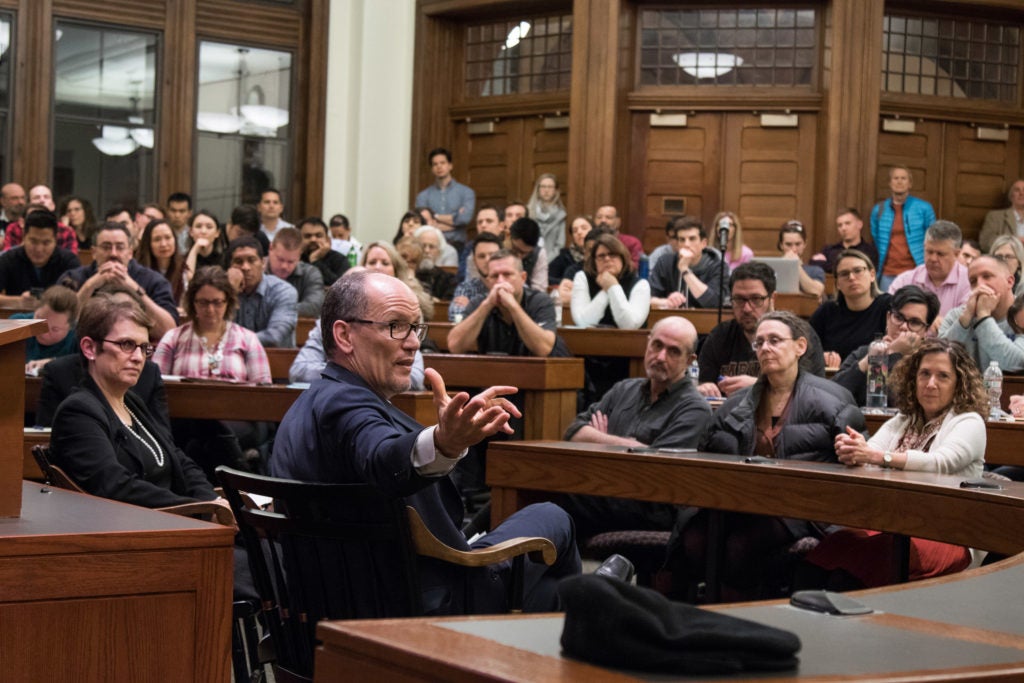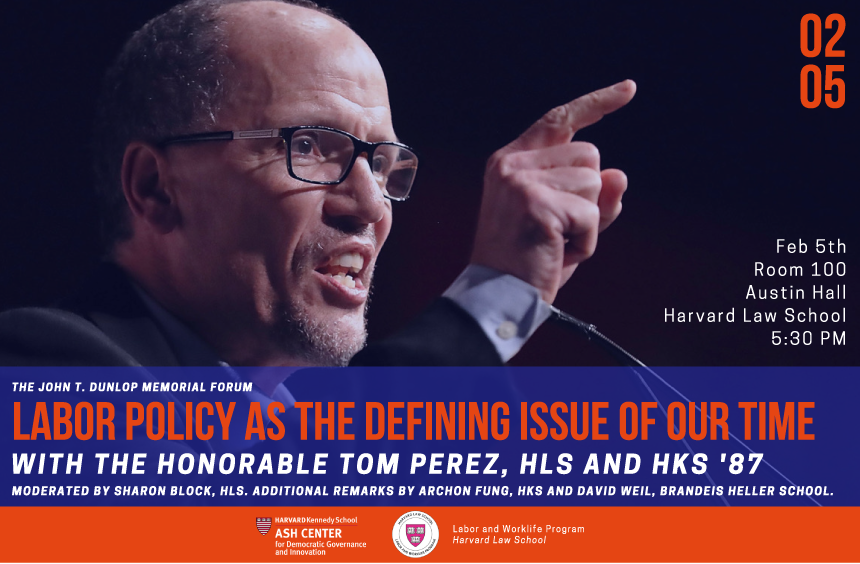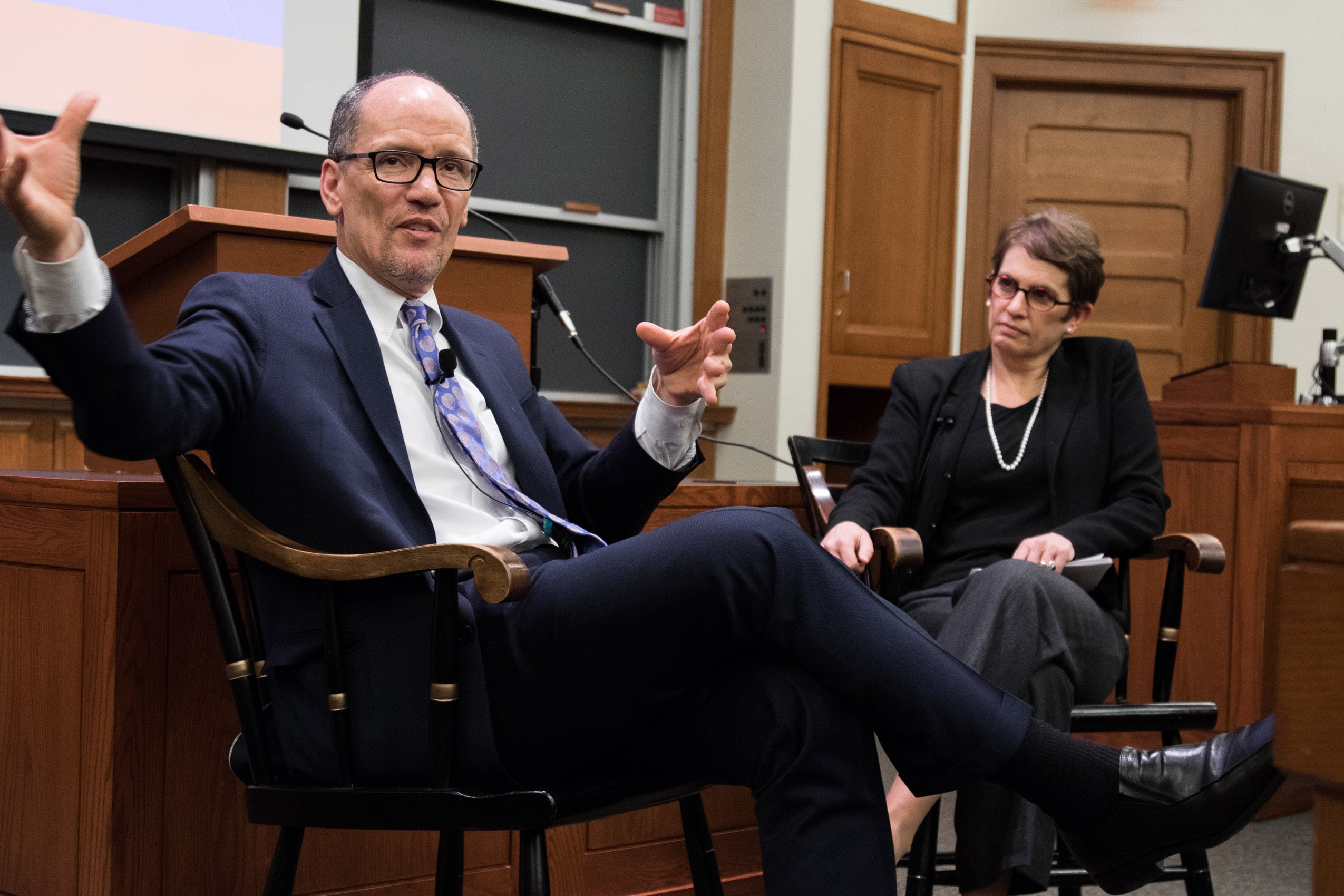It took decades to lay the foundations for the social compact that flourished in post-war America and created enormous, shared wealth. It could take far less to roll back all the gains that were made, warned Tom Perez M.P.P./J.D. ’87, former Secretary of Labor under President Obama and the current chair of the Democratic National Committee.
Perez, speaking at the John T. Dunlop Memorial Forum Lecture at Harvard Law School on Feb. 6, addressed the future of organized labor and the challenges of income inequality in the United States.
Setting the tone for the evening, Archon Fung, academic dean at Harvard Kennedy School and the Winthrop Laflin McCormack Professor of Citizenship and Self-Government, noted that “a single achievement of the democracies of Western Europe and North America in the 20th century was to create post-war welfare states that shared the fruits of economic prosperity among many of their citizens.” Yet, Fung added, that social compact has eroded as income inequality has risen dramatically over the ensuing generations with many questioning “whether we can create a new regime of shared prosperity for the 21st century.”

This social compact took nearly four decades to build, including the twin shocks of the great depression and Second World War, Perez said. He argued that it should be no surprise that income inequality in the 20th century was at its lowest when labor union density was at its highest, with collective bargaining helping to ensure the existence of a robust middle class in the United States. Productivity and wage growth were not mutually exclusive, and workers had a strong incentive in promoting the viability and prosperity of their employers. “Our greatest generation became our greatest generation of labor leaders,” Perez said.
“I’m a firm believer that when workers feel like they have a stake in where they’re working, they’re happier and they’re more productive, and it’s win-win,” he said. Perez termed it the John Dunlop theory of governance, after the late Harvard School professor and former Secretary of Labor under President Gerald Ford for whom the lecture is named, “because when you build a big table and give everyone a meaningful seat at the table, you can get really good outcomes.”
Questioned about what he would have done at the Labor Department were he given a political carte blanche, Perez answered without hesitation that he would pass a workers’ bill of rights. “The minimum wage is $15 an hour and it will be indexed so that we don’t have to have this conversation. It would say that paid sick leave is the law of the land,” he said. The former labor secretary called for the passage of a portable benefits package “so that if you do work three jobs, you’ll still paying into retirement.” He was quick to add that proposal “would obviously include the right to organize.”
Addressing labor organizers in attendance who were concerned about rolling back the gains made during his tenure as labor secretary on issues such as workforce protection, worker training, and enforcement, Perez implored the audience to be vigilant. The biggest challenge to protecting those gains is simple arithmetic he added. “we don’t have the leverage that we need.” Shifting to his role as DNC chair, he sounded a note of optimism about elections this November. “We have a tremendous opportunity in 2018. And the lesson, and I leave you with… is that when we are united, we are at our best,” he said.

The evening served as a reunion of sorts for the senior leadership of the Obama-era Department of Labor as Perez appeared alongside HLS Labor and Worklife Program Executive Director Sharon Block who served under the former cabinet secretary as a senior counselor. Perez and Block were joined by David Weil HKS Ph.D. 1987, the dean of the Heller School of Management at Brandeis University, who previously headed the Wage and Hour Division at the Labor Department as well as co-founding the Transparency Policy Project at the Ash Center for Democratic Governance and Innovation at HKS.
Weil, who himself gave the keynote address at the Dunlop Forum in 2015 when he was serving in the Department of Labor, delivered a tribute to Dunlop and his six decades of service to the university. Dunlop, Weil noted, “came from a lifelong career of practice, and one of the reasons why so many people who worked with John were very affected by that notion of bringing academic excellence and rigor to the area of applied practical problems as he often called it.”
